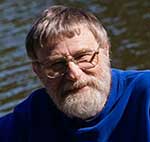October 15, 2019
Editor’s Note: Originally posted on the Patient Partnering Blog.
 By Richard Zorza —
By Richard Zorza —
A few months ago, I had been visiting a deeply humble but very eminent scientist who was in the last stages of life in our retirement community, and on the way out, I asked the staffer taking day-to-day care of him, “Do you know who that is?” She had absolutely no idea, and I briefly told her of his contributions, some of which she would have know of, at least in a very general way in terms of the impact on her life.
She beamed, and was clearly proud to be taking care of him. I am sure that the care did not get any better medically, but I bet it was a bit more joyful.
This is just a nice example of the broader approach described in a recent article in the Washington Post. As described, a retired journalist, starting first with her father, “offered to use her professional skills to write her father’s story for [the staff at his dementia care facility] — including the bit about how he was once a part-time driver for Winston Churchill and how he liked to amble around the cypress trees and lavender fields in the south of France, where he had a country home.”
“[The caregivers] loved it,” she recalled. Knowing personal details of her father’s life helped his caregivers understand trigger points that could upset him and references that might please him. “It completely transformed his care.” The experience was so powerful that Newton-Small began compiling stories for others, first as a favor to friends and then as a start-up business that provides memory care facilities with online profiles that include personal anecdotes, photos, videos and recordings of favorite songs. This fall she left her reporting job to pursue it full time.
I do not think that this should be limited to dementia patients, and I suspect that at least in many multi-level care communities the task can alternatively be done by volunteers, making it easier to spread it quickly, but the general point is dead on. You do a better job, and certainly a happier job, when you really know about who you are taking care of.
For patients who can communicate, one of the very best ways to bring them into partnership is to find out about them. The time spent, in other than very brief relationships, will be more than recovered in more effective communications and understanding on both sides.
It would be interesting to study whether training medical staff to obtain a broader view of “medical history” would have an impact on all kinds of outcomes.
Newton-Small, the retired journalist, said she believes that having professional journalists write the profiles is crucial. When that task is left to the families, she said, “some are well-written, but the vast majority are terribly written, and families take months and months to fill them out. You have to find somebody to synthesize the information.”
That would be an interesting thing to test, and may depend on a lot of factors. The argument for those with expertise in research and writing is probably strongest for dementia patients. I do know that in our retirement community, near Washington, D.C., the group that produces our monthly newsletter routinely includes life profiles of most new residents. Some of them are retired journalists, but many are from other fields. Take a look for yourselves. Several years of the publication, the Collingtonian, are posted online. You will probably have to scroll down to get to the incoming resident’s profiles. They are amazing. We are talking about how to make sure those profiles get into the hands of those taking care of them, to the extent that residents and families want it. Maybe those profiles could be linked into the Electronic Medical Record.
Every caregiver should be proud of what they do, and we should all help them feel that pride. And the more patients know about their caregivers would be all for the better, too.
